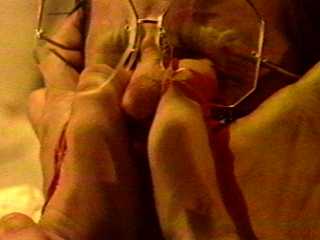 “I want more life, fucker.” So are the immortal words of the rapidly decaying, mortal Roy Batty (Rutger Hauer), a replicant who wants his artificial incept date (death date) eliminated by his God-like maker, Tyrell (Joe Turkel), so that he (Roy) can be subject to the same organic causes of death as humans. At least this is what Roy Batty says in the original version of Blade Runner [1982] and Blade Runner: The Director’s Cut [1992]. In Blade Runner: The Final Cut [2007], which is apparently the absolute final version of the film, Roy Batty seethes “I want more life, father.”
“I want more life, fucker.” So are the immortal words of the rapidly decaying, mortal Roy Batty (Rutger Hauer), a replicant who wants his artificial incept date (death date) eliminated by his God-like maker, Tyrell (Joe Turkel), so that he (Roy) can be subject to the same organic causes of death as humans. At least this is what Roy Batty says in the original version of Blade Runner [1982] and Blade Runner: The Director’s Cut [1992]. In Blade Runner: The Final Cut [2007], which is apparently the absolute final version of the film, Roy Batty seethes “I want more life, father.”
This subtle change—one word—brings to the surface a religious theme that, until now, remained submerged in the first two versions. This one word—father—illuminates a religious theme of God and Christ. When viewing Blade Runner through this thematic prism, particular elements of the film suddenly become more clear and take on more meaning. Suddenly, Roy Batty is a Christ figure who puts a nail through his hand as he suffers the sins of those who made him. (In the two previous versions, one could interpret this masochistic act as a way for Roy to continue to feel life—to feel anything—as his body succumbs to premature rigormortis during his rapid artificial death.) And in the infamous “I’ve seen things you people wouldn’t believe…” monologue, suddenly, Batty becomes a Christ figure who teaches Deckard (Harrison Ford) forgiveness and the ultimate value of life.
And that’s it. Mostly. Besides a notable change in the skyscape when Roy Batty releases the symbolic white bird into clear, blue sky to something that is more consistent with the rest of the film, there is no other discernable difference between The Director’s Cut and The Final Cut. Perhaps there are some rare, minor brushstrokes throughout the film, but they are so minute that it would take a frame-by-frame analysis to discover them. (I think that a brief line of dialogue may have been added to Bryant’s briefing of Deckard. And quite possibly Ridley Scott may have edited out the more egregious frames of the obvious stunt double used for Joanna Cassidy when her character is shot in the back by Deckard.) Blade Runner: The Final Cut is devoid of any hidden vault footage having lay dormant for the past 25 years. There are no hitherto unknown scenes restored to the film. There aren’t even any significant modifications to existing scenes except for the aforementioned. Sorry folks.
Instead, The Final Cut is an effort to enhance an existing, underlying theme with subtle—very subtle—edits. It seems that Ridley Scott’s only intention is to restore to its fullest the literary, thematic complexity of the film as it was originally intended, not to throw fresh meat to the rabid fans of this cult classic. Even the 1992 Director’s Cut provided new footage (or lack thereof) to enhance the critical, existential theme of identity (Deckard is actually a replicant) and to communicate a more overall existential vision. 2007’s The Final Cut enhances another of the film’s critical themes but with blink-and-you’ll-miss-it additions. Yet the masterfully reserved change is brilliant and satisfying; it clarifies a whole new dimension of the story.
Blade Runner has finally come full circle from its origins as a relatively pedestrian neo-film noir detective story (albeit with a breathtaking vision of the future) to a thematically complex meditation on identity and God. But one has to wonder why it took not one but two alternate versions to finally bring to light the submerged God/Christ theme. (What was so controversial about this in 1982? Would the Christ references really have offended people? Perhaps in the end it was just an unfortunate commercial decision by the studio distributor.) Nevertheless, moving 25 years into the future, the aggregate of the enhanced identity and God/Christ themes finally gives a cult classic enough substantive weight to begin putting to rest the ongoing argument that the film is an exercise in style over substance. It will only be the rabid fans (i.e., Blade Runner geeks) who salivate over the film’s look and feel rather than it’s complex thematic aspirations that will be left seething, “I want more movie, fucker.”
Justin Baker